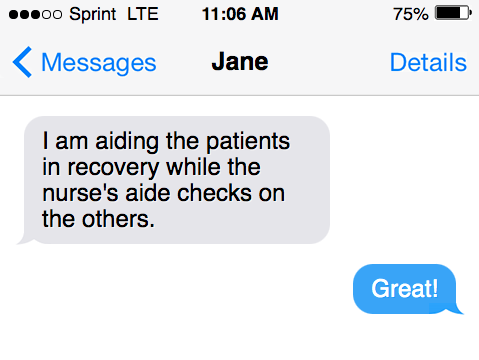Aid vs. aide, which is correct? In the English language, the word “aid and “aide” can get used quite frequently. The question becomes, are they interchangeable? Do they hold the same meanings? When we refer to something as a “visual aid,” is it “visual aid or visual aide?” Is the “e” letter appropriate?
Learn the correct way to use both “aid” and “aide” in this short guide…
Definition of “aid”
According to Merriam-Webster, an “aid” in its noun form means to “help, typically of a practical nature.” When referred to in its verb form, it means to “help, assist, or support (someone or something) in the achievement of something.”
Most commonly, “aid” is used in the third-person present tense form, “aids.” And the past tense form and past participle form, “aided.”
“Aiding” is the present participle tense form of the verb “aid.” For example, “I am aiding the patients in recovery while the nurse’s aide checks on the others.”
A menu aid, for example, is a tool used to assist others in comprehending large text. Think of the word “assist.”
| Word | Definition |
| Aid (noun) /ād/ | help, typically of a practical nature. |
| Aide (noun) /ād/ | an assistant to an important person, especially a political leader. |
Examples of the word “aid” in a sentence
“I need a hearing aid because I can’t hear anything any longer.”
“I would love to be an aid to the volunteers.”
“I’m applying for financial aid because I don’t have enough money to attend college.”

Definition of “aide”
The definition of “aide” is “an assistant to an important person, especially a political leader.” Someone could be an “aide” when they are part of a political campaign.
“Aide” entered the English language in the 15th century, as a shortened form of the word “aide-de-camp,” which refers to a military officer.
Common titles with the word “aide” in them:
- Teachers’ aide
- Political aide
- Nurse’s aide
In these examples, aides are those who help complete tasks for their respective counterpart.
Outside examples of the word “aide” in a sentence
“The nurse’s aide arrived to the hospital room to help check on the patient with the physician.”
“A politicians aide will assist in a variety of political related tasks. Including the running of campaigns and ensuring that schedules are completed in a timely fashion.”
“The politicians top aide decided to speak with the reporters.”
Difference between “aide” and “aid”
“Aid” refers to assistance that you receive. Remember “financial aid” to help. The past tense form of the verb is “aided.” For example, “the volunteers aided the others in getting back on their feet after the game.”
It can get confusing in the English language since an “aide” is typically a person. For example a “nurse’s aide.” It’s often confused because “emergency aid” is the correct spelling. And frequently, the confusion is around hospital settings.
An “aide” is an assistant to an important person. For example, using the “nurse’s aide” title once more, they are an assistant to the physician (the important person).
Key differences
The two words have entirely different meanings. They can be confused since they hold the same pronunciation and look similar.
“Aid” means to provide assistance or to be giving assistance.
While “aide” is the assistant to a person of power.
They sound alike, although have very different meanings.
How to remember “aide” vs “aid”
The simple trick and easy way to remembering is that “aid” is used as a noun most commonly. Replace the word “aid” with “assistance” or “help.” If the sentence looks grammatically correct, the writing is most likely correct.
For example, “I wanted to provide aid to the wounded people in the natural disaster.”
And, “I wanted to provide assistance to the wounded people in the natural disaster.”
The word “aid” can get used as either a noun or a verb. Both the noun meaning and verb meaning tend to mean “help.”
Article summary
Phrases that use aid are “financial aid,” or “providing aid.” “Aid” can get used as either a verb or used as a noun. Remember the difference by “aide” being a person and “aid” being a replacement for “help.”
Simple recap: Use “aide” for people and “aid” when referring to help.
Common questions
Questions from those curious about the English language.
When referring to a person, are they an “aid” or “aide?”
Typically, they are referring to the “aide,” as a person. So, yes, an “aide” is a person. An “aid” is not a person, it is a type of assistance. It is considered a replacement for the word “help.”
Is it nurse’s “aid” or “aide?”
The correct way to spell this is “Nurse’s Aide.”
Is an “aide” always referring to a person?
Yes. “Aid” is a replacement word for “help” or “assistance.” Other synonyms include support, backing, cooperation, or “a helping hand.”
Is it “first aid” or “first aide?”
The correct spelling is “First Aid.” Because the word “aid” is always used to provide someone with assistance. Organizations like Red Cross or Mayo Clinic will use “aid” and not “aide.”
Sources
- Aid Definition & Meaning – Merriam-Webster
- AID | definition in the Cambridge English Dictionary
- Present Tense Verbs in Third Person – English Grammar
- Past Participles in English Grammar – ThoughtCo
- Aide Definition & Meaning – Merriam-Webster
- Aide-de-camp – Wikipedia
- Learn How to Perform First Aid – Red Cross
Inside this article
Fact checked:
Content is rigorously reviewed by a team of qualified and experienced fact checkers. Fact checkers review articles for factual accuracy, relevance, and timeliness. Learn more.
Core lessons
Glossary
- Abstract Noun
- Accusative Case
- Anecdote
- Antonym
- Active Sentence
- Adverb
- Adjective
- Allegory
- Alliteration
- Adjective Clause
- Adjective Phrase
- Ampersand
- Anastrophe
- Adverbial Clause
- Appositive Phrase
- Clause
- Compound Adjective
- Complex Sentence
- Compound Words
- Compound Predicate
- Common Noun
- Comparative Adjective
- Comparative and Superlative
- Compound Noun
- Compound Subject
- Compound Sentence
- Copular Verb
- Collective Noun
- Colloquialism
- Conciseness
- Consonance
- Conditional
- Concrete Noun
- Conjunction
- Conjugation
- Conditional Sentence
- Comma Splice
- Correlative Conjunction
- Coordinating Conjunction
- Coordinate Adjective
- Cumulative Adjective
- Dative Case
- Determiner
- Declarative Sentence
- Declarative Statement
- Direct Object Pronoun
- Direct Object
- Diction
- Diphthong
- Dangling Modifier
- Demonstrative Pronoun
- Demonstrative Adjective
- Direct Characterization
- Definite Article
- Doublespeak
- False Dilemma Fallacy
- Future Perfect Progressive
- Future Simple
- Future Perfect Continuous
- Future Perfect
- First Conditional
- Irregular Adjective
- Irregular Verb
- Imperative Sentence
- Indefinite Article
- Intransitive Verb
- Introductory Phrase
- Indefinite Pronoun
- Indirect Characterization
- Interrogative Sentence
- Intensive Pronoun
- Inanimate Object
- Indefinite Tense
- Infinitive Phrase
- Interjection
- Intensifier
- Infinitive
- Indicative Mood
- Participle
- Parallelism
- Prepositional Phrase
- Past Simple Tense
- Past Continuous Tense
- Past Perfect Tense
- Past Progressive Tense
- Present Simple Tense
- Present Perfect Tense
- Personal Pronoun
- Personification
- Persuasive Writing
- Parallel Structure
- Phrasal Verb
- Predicate Adjective
- Predicate Nominative
- Phonetic Language
- Plural Noun
- Punctuation
- Punctuation Marks
- Preposition
- Preposition of Place
- Parts of Speech
- Possessive Adjective
- Possessive Determiner
- Possessive Case
- Possessive Noun
- Proper Adjective
- Proper Noun
- Present Participle
- Prefix
- Predicate



